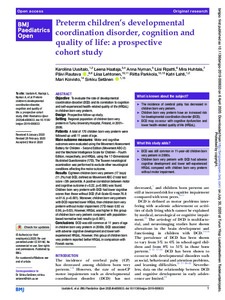Preterm children's developmental coordination disorder, cognition and quality of life: a prospective cohort study
Karoliina Uusitalo; Leena Haataja; Anna Nyman; Liisi Ripatti; Mira Huhtala; Päivi Rautava; Liisa Lehtonen; Riitta Parkkola; Katri Lahti; Mari Koivisto; Sirkku Setänen
https://urn.fi/URN:NBN:fi-fe2021042822234
Tiivistelmä
Objective To evaluate the rate of developmental coordination disorder (DCD) and its correlation to cognition and self-experienced health-related quality of life (HRQoL) in children born very preterm.
Design Prospective follow-up study.
Setting Regional population of children born very preterm in Turku University Hospital, Finland, in 2001–2006.
Patients A total of 170 children born very preterm were followed up until 11 years of age.
Main outcome measures Motor and cognitive outcomes were evaluated using the Movement Assessment Battery for Children - Second Edition (Movement ABC-2) and the Wechsler Intelligence Scale for Children - Fourth Edition, respectively, and HRQoL using the 17-Dimensional Illustrated Questionnaire (17D). The Touwen neurological examination was performed to exclude other neurological conditions affecting the motor outcome.
Results Eighteen children born very preterm (17 boys) (11.3%) had DCD, defined as Movement ABC-2 total test score ≤5th percentile. A positive correlation between motor and cognitive outcome (r=0.22, p=0.006) was found. Children born very preterm with DCD had lower cognitive scores than those without DCD (Full-Scale IQ mean 76.8 vs 91.6, p=0.001). Moreover, children born very preterm with DCD reported lower HRQoL than children born very preterm without motor impairment (17D mean 0.93 vs 0.96, p=0.03). However, HRQoL was higher in this group of children born very preterm compared with population-based normative test results (p<0.001).
Conclusions DCD was still common at 11 years of age in children born very preterm in 2000s. DCD associated with adverse cognitive development and lower self-experienced HRQoL. However, this group of children born very preterm reported better HRQoL in comparison with Finnish norms.
Kokoelmat
- Rinnakkaistallenteet [29337]
